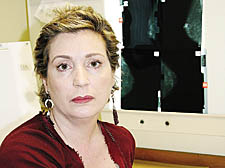|
|
 |
| |
Facing new year without hair taught me a valuable lesson
Radiologist urges young women to have regular breast cancer screenings
ON Christmas Day 2005, Dr Sarah Burnett woke up to find that her hair had started to fall out. A week later, on New Year’s Day, while others were recovering from hangovers, the 44-year-old radiologist decided to shave her head and face the new year bald.
Dr Burnett, who works as an independent consultant, was diagnosed with breast cancer in November 2005 after a routine breast screening revealed 11 tumours. Five days later, she had her right breast removed in a gruelling five-hour operation.
In December, she started five months of chemotherapy sessions that resulted in her hair loss. Today Dr Burnett has come to the end of her treatment.
She is now passionate about the need for more women in their late 30s and early 40s to be offered routine screenings.
She said: “Breast cancer in younger women is far more aggressive than in elder women. They can live in harmony with their cancer. When you are younger your female hormones encourage the growth of the cancer.
“It’s not just about saving lives.
“Most women with breast cancer survive for at least 25 years. What we are talking about is halving the rates of women needing mastectomy and chemotherapy, which in terms of quality of life is very important.
“I would not be here today if it had not been for my screening.”
Currently, the national breast cancer screening programme offers women between the ages of 50 and 70 a screening every three years. Nearly one-and-a-half million women are screened each year, saving an estimated 1,400 lives a year.
But a recent 10-year study by scientists at Cancer Research UK which looked into the benefits of annual breast screening for women aged 40 to 50 – commonly offered in other European countries – concluded there was “no definitive evidence” for these women to be included.
But Dr Burnett said: “The problem is that this data is at least 15 years out of date. Obviously a mammogram is a far more accurate science than it was.
“Digital mammograms are far more sensitive and they get around the problem of firmer breasts in young women. We are getting a more accurate diagnosis now than we used to.”
She added: “My concern is that you move so far forward and then one piece of research is produced that the government can latch on to and say there is no benefit.
“There is no doubt that the majority of women who are diagnosed with breast cancer are over 60.
“But I would urge younger women who are concerned or who have a history of breast cancer in their families not to be fobbed off and insist on being screened. You save a lot of trauma with an early diagnosis.”
Professor John Toy, medical director of Cancer Research UK, who produced the report, said: “The paper shows no definitive evidence presently for women in their 40s to be included in the NHS screening programme.
“More years of follow-up, however, might reveal a benefit.
“We encourage women of all ages, and particularly older women in whom breast cancer is more common, to be breast aware and to see their doctor straight away if they notice any change in their breasts.” |
 |
|
 |
|

